 CAW Newsletter: Spring 2025
CAW Newsletter: Spring 2025
CAW members have many exciting programs, input opportunities, and events on the horizon – check them out below!
Project Builder: New Program requesting Applications
The Piscataqua Region Estuaries Partnership (PREP) has launched Project Builder, a new program designed to help communities turn their climate resilience ideas into strong, fundable proposals. If you’ve ever thought, “We want to address flooding or heat, but don’t know where to start,” this program is for you. With support from PREP, NH Sea Grant, and the NH Coastal Adaptation Workgroup, participants get mentorship, strategy support, and connections to potential collaborators. This year’s focus: projects that address extreme heat and/or flooding in the Great Bay Watershed.
While Project Builder doesn’t fund projects directly, it helps you get grant-ready, including applying for the upcoming Adapting Together’s Climate Impact Grants (offering up to $25,000 in funding and to be released in fall 2025). This program is open to everyone in the Great Bay Watershed, conservation commissions, artists, planners, public health teams, and more. Applications are due July 1, 2025.

This project is supported by The New Hampshire Charitable Foundation’s Great Bay 2030 initiative.
Updating the NH Coastal Flood Risk Summary
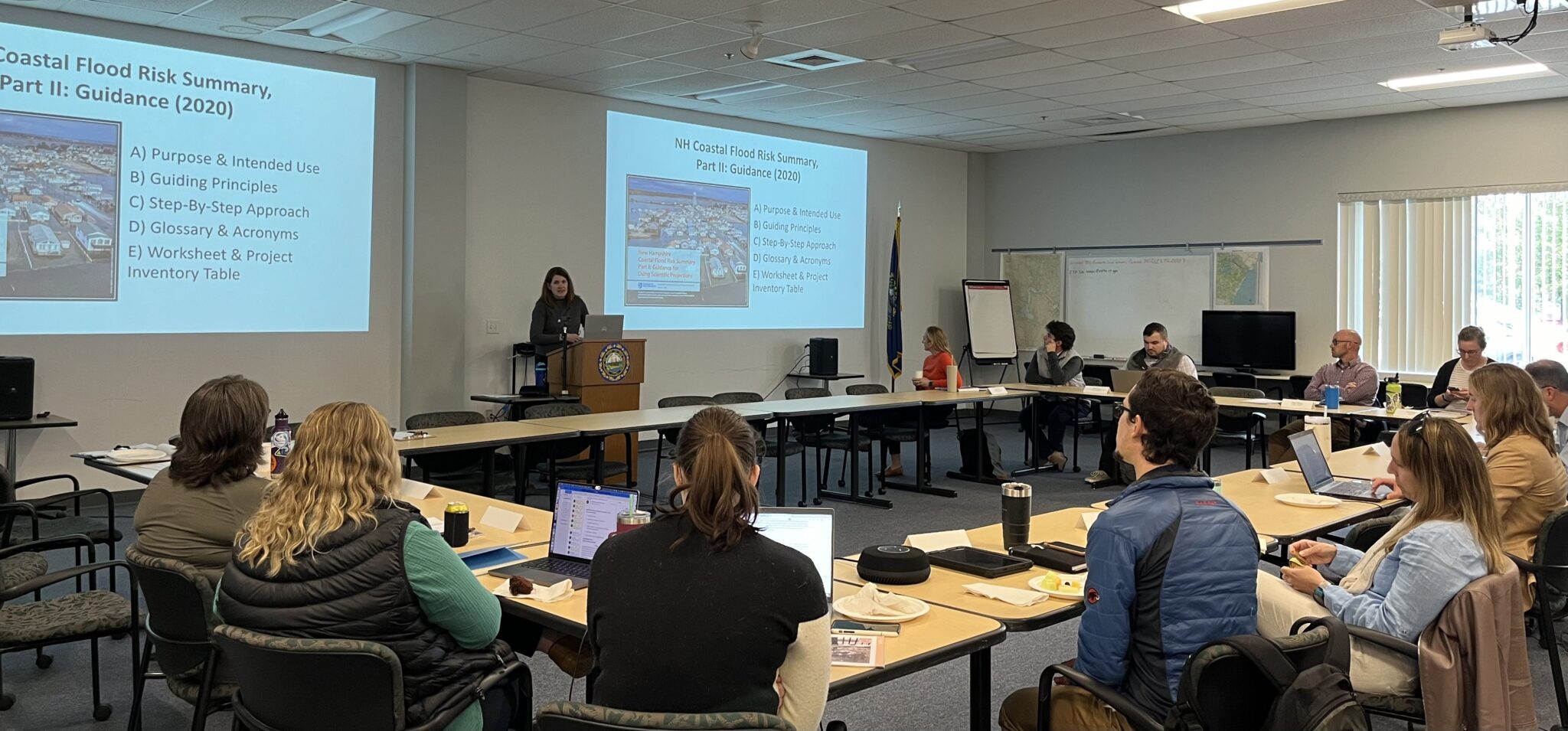
An update of the 2019-2020 NH Coastal Flood Risk Summary is currently underway. This will fulfill the requirements of RSA 483-B:22, which directs NHDES to supervise updates to the 2014 Coastal Risk and Hazard Commission Science and Technical Advisory Panel report at least every five years. The NH Coastal Flood Risk Summary is comprised of two parts, including “Part I: Science” and “Part II: Guidance for Using Scientific Projections.” NHDES is collaborating with staff from NH Sea Grant and UNH Cooperative Extension to coordinate the update and associated engagement and trainings.
To date, we have been focused primarily on updating the Part I: Science report (2019), but we are beginning to shift gears to updating Part II: Guidance for Using Scientific Projections (2020) (Guidance link | brief video summary). The purpose of the Guidance is to enhance understanding and application of the scientific projections in Part I, to support users to incorporate coastal flood risk information in their planning and decision-making.
We are collecting feedback about the existing Guidance – what works well, what’s challenging, whether and how people have used it, and other ideas to consider in the updated Guidance. We welcome responses from those who have used the existing Guidance as well as those who have not yet used it or who are unsure whether or not they have used it. All input helps make this Guidance helpful and effective for users.
The survey will be open through 5pm Friday, June 13th. We would greatly appreciate if you could set aside time in the coming weeks to make your way through the survey. If you know of other folks who are likely to have used the existing Guidance or who may be interested in using the updated Guidance, please pass this along!
At the end of the survey, there will be an opportunity to share your contact information if you would like the team to follow up with you on your responses, and/or if you would like to enter a raffle for a $25 gift card in appreciation of your time spent on the survey. You also do not need to share your contact information if you prefer. All responses will be de-identified and summarized into a report; individual responses will not be identified.
Note: If translation services or other accommodations are needed in order to complete this survey, please reach out to Lisa.Wise@unh.edu. The University of New Hampshire Cooperative Extension is an equal opportunity educator and employer. UNH, U.S. Dept. of Agriculture, and New Hampshire counties cooperating. Direct inquiries to unh.civilrights@unh.edu.
Thank you in advance for your time and feedback!
New Hampshire Coastal Viewer: New Website Now Available
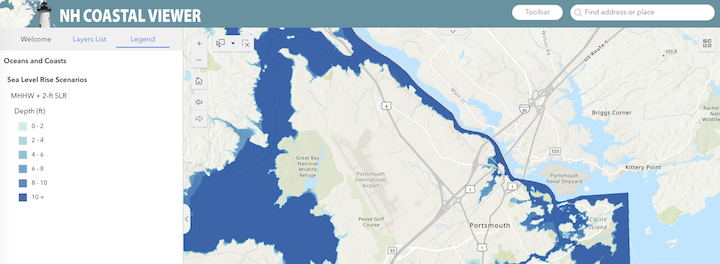
The NH Coastal Viewer is now available on a new website and in a new format. The Viewer has been moved to the ArcGIS Experience Builder platform, which is compatible with all major browsers and accessible with mobile devices (with some limitations). The new Viewer provides continued access to NH’s most recent coastal data and includes features such as the draw and measure tool, ability to add data, attributes tables, and the ability to print maps.
Resources to help users explore the features in the new format are available at the links below and when you click on the Viewer’s Help button in the top toolbar.
- The NH Coastal Viewer User Guide Story Map is available for users to either scroll through to learn more about the new Viewer’s features or click on the tab buttons at the top to learn more about a specific topic.
-
The Introduction to the NH Coastal Viewer video is available for users to watch a demonstration of the features of the Viewer.
- A Getting Started with the NH Coastal Viewer document highlights and describes the viewer’s features and walks users through using the data layers and the toolbar buttons.
- The Layer List document provides the organizational layout and layers available in the Viewer.
New NH Coastal Viewer Link:
https://experience.arcgis.com/experience/466840bb23404bc7b69e632984ffa320
NH Coastal Viewer Landing Page (provides a simpler link to share with others when directing them to the Viewer and the resources listed above): https://www.nhcoastalviewer.org
Please note: While the previous NH Coastal Viewer will be available for the next several months, its content and data will no longer be updated.
About the NH Coastal Viewer: The NH Coastal Viewer is an online mapping tool that offers users access to spatial data describing the state’s coastal resources and coastal hazards. It was developed and is being managed by NH GRANIT in partnership with the NH Department of Environmental Services Coastal Program and provides access to a suite of GRANIT data layers as well as data sets and map services published by project partners and other state, regional, and federal organizations.
Upcoming Events
- Climate Adaptation Forum – Protecting Our Communities: A Whole-Society Approach to Resilience – 6/6, 9am-12pm | Virtual and In-Person in MA
- A Closer Look at PFAS in the Seacoast – 6/12, 5:30pm-7:30pm | Greenland, NH
- Local Solutions: Bouncing Forward to Create Resilient Communities – 9/18-9/19 | Hanover, NH
- NH Healthy Climate webinars
- Nature Groupie – volunteer opportunities
Floodplain Training: Substantial Improvement & Damage Requirements for Buildings in Special Flood Hazard Areas
The NHDES Coastal Program has partnered with the NH Office of Planning and Development Floodplain Management Program to offer a free, 1.5-hour training about the substantial improvement and substantial damage requirements for buildings in special flood hazard areas. The training is open to anyone interested in learning about how to administer and enforce these requirements, including the process to make these determinations, other related local responsibilities, and resources and best practices. The training will be held both in-person and virtually (and recorded) and will present the same information at both events.
- June 17, 9:00 to 11:30 AM at the Newmarket, Town Hall, Downstairs Auditorium, 186 Main Street
- June 18, 2:00 to 3:30 PM, Virtually on Teams
Please email Jen Gilbert at jennifer.r.gilbert@des.nh.gov if you are interested in participating in one of the training opportunities or if you have any questions.
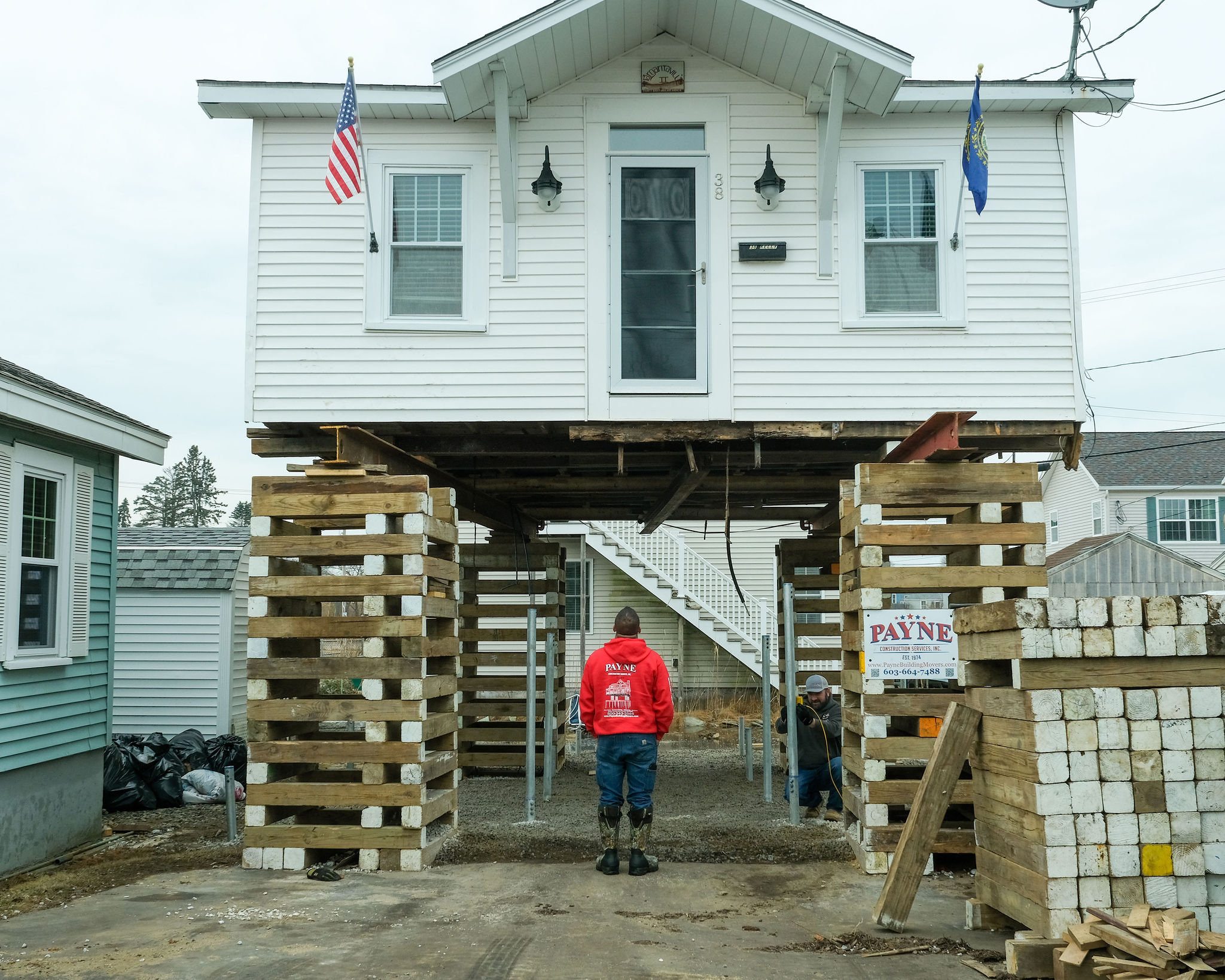
Elise Sullivan
Recent Event

CAW member Lisa Wise (NH Sea Grant/UNH Extension) recently participated in the By Degrees Climate Summit, hosted by NHPR in partnership with New Hampshire PBS. Lisa joined colleague Amanda McQuaid, a state specialist in water quality with UNH Extension, to host one of several breakout discussions with participants. The discussion focused on water quality impacts of climate change, cyanobacteria, and what communities and individuals can do to protect water quality in the face of climate change. A recording of the keynote presentation by Dr. Jola Ajibade, an environmental and human geographer from Emory University, is available here.
Welcome, New CAW Members!
In recent months, CAW has welcomed several new members. Get to know some of them here!
New Resources
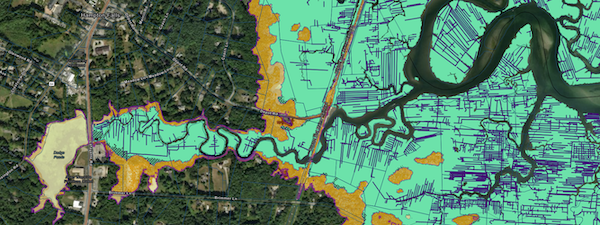
New Report Offers Strategies for Protecting Marsh Migration Pathways: The Great Bay National Estuarine Research Reserve (GBNERR) has wrapped up the Pathways to Salt Marsh Resilience Project. Check out the final report at the link below, and sign up for a webinar on June 12 to learn more.
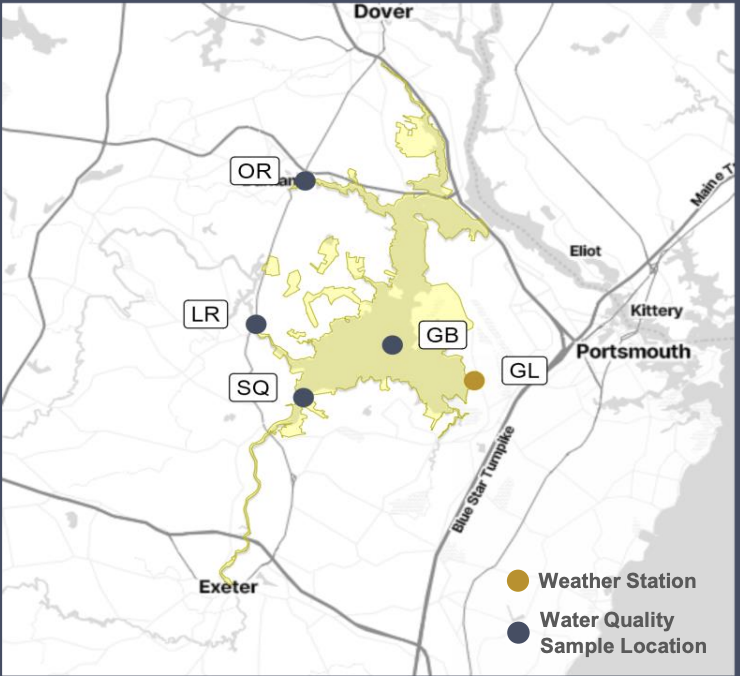
The research team at the Great Bay National Estuarine Research Reserve and the water quality lab at UNH’s Jackson Estuarine Lab have finalized the 2023 SWMP (System-wide monitoring program) Great Bay water quality report. This year’s report, alongside the last four years, can be found at this website under the ‘Water Quality’ tab.
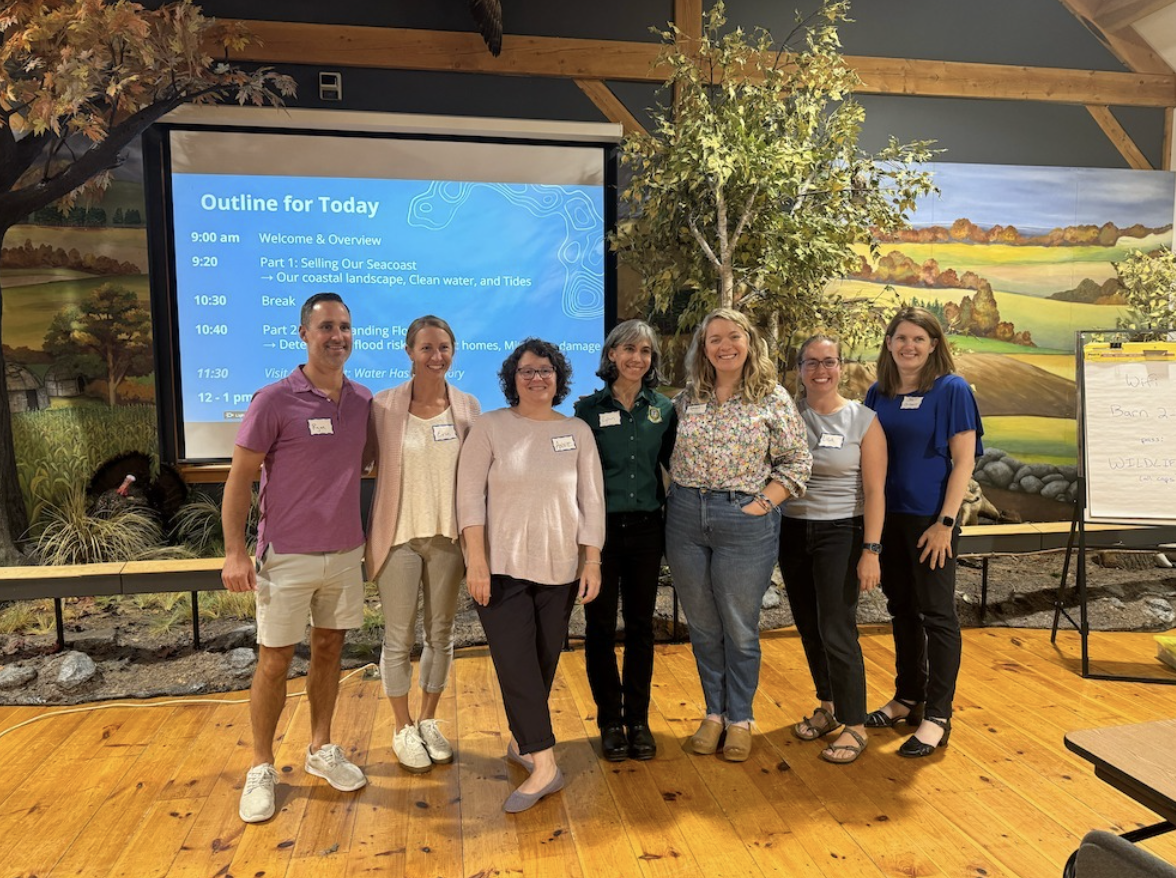
Last year, several CAW members collaborated with local real estate professionals to develop a training for realtors called “Living with Water,” covering a range of topics from local natural resources, water quality, and tides to understanding flood maps and thinking about projections. The training was very well received and we are excited to hold another program later this year. To support the training event, the team compiled relevant resources – check out the webpage below!
NH Climate-related News
- UNH Scientists Helping Address Threats to a Critical Wildlife Refuge
- What’s Next: UNH Experts Forecast Key Industry Trends for the New Year
- Phytoplankton Monitoring in Gulf of Maine as a Signal of Climate Change Impacts
- Small ocean creatures could help fight climate change, according to Dartmouth researchers | Mara Hoplamazian, NHPR
- During a snowy weekend, high schoolers learn about snow – and reflect on climate change | Mara Hoplamazian, NHPR
- Some federal climate funding unfrozen in New Hampshire | Mara Hoplamazian, NHPR
- A look back at the year in New England climate and environment news | Cori Princell, New England News Collaborative
What are CAW members reading and listening to?
Here’s a roundup of what some CAW members are reading and listening to lately. Have more recommendations for us? Please send them our way!
- Wintering: The Power of Rest and Retreat in Difficult Times by Katherine May
- Fairy Tale by Stephen King
- Wayfarers series by Becky Chambers
- Poverty, By America by Matthew Desmond
- Over and Under the Wetland by Kate Messner
- Abundance by Ezra Klein and Derek Thompson
- Breath: The New Science of a Lost Art by James Nestor

Growing a community of changemakers! The Great Bay Changemaker Program ended 2024 with its second annual fall Bootcamp, in which 25 Seacoast-area residents learned how to become clean water champions and advocates in their communities. To learn more, visit the program website and sign-up here to hear about upcoming programs such as Changemaker Chats, summer Watershed Walks, and the fall Bootcamp. The application opportunity for the fall 2025 Changemaker Bootcamp will open in June.
This newsletter is brought to you by the NH Coastal Adaptation Workgroup, a collaboration of organizations working to assist communities in NH’s coastal watershed to prepare for the impacts of extreme weather and long-term climate change by providing resources, facilitation, and guidance that enhances readiness and resilience.
www.nhcaw.org
UNH Extension staff coordinate this newsletter. The University of New Hampshire Cooperative Extension is an equal opportunity educator and employer. UNH, U.S. Dept. of Agriculture, and New Hampshire counties cooperating. Direct inquiries to unh.civilrights@unh.edu.
